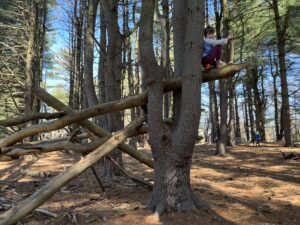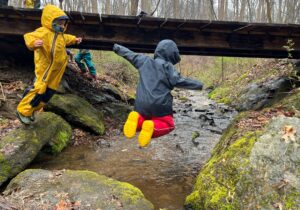The return of leaves and flowers, insects and animals greets us each spring day at our Nature Preschool. Our children show up with smiles on their faces, ready to explore and discover what the day might have in store. As the weather turns warmer, we shuck off our mittens and boots and head out to see how the world is changing around us with the coming of spring.
Our 3-5 year old Nature Preschoolers–and their teachers–are a hardy bunch. They find joy in each day, whether that day includes sunshine and warm weather or rain and cold. Their days are spent hiking, climbing, and exploring in forests and fields, ponds and streams. As the children spend time in nature, their connection to the Earth deepens as they learn how it sustains us as well as all the wild creatures.
Children are natural explorers and scientists. While outdoors, Nature Preschoolers have thoughtful discussions about everything from using their senses to observe plants to why dead animals they found may have died. Climbing trees and balancing on rock walls teaches children to assess risks, as well as their own talents and limits.
Rachel Carson writes in her book The Sense of Wonder, “If a child is to keep alive his inborn sense of wonder…he needs the companionship of at least one adult who can share it, rediscovering with him the joy, excitement, and mystery of the world we live in.” Our Nature Preschool teachers embody this idea, becoming guides for their students, holding their hands as they move through the world and helping them to learn not just facts, but how to be curious; how to retain that excitement and sense of mystery and wonder. They guide them in learning that we are all part of the same earth: humans, animals, plants, water, rocks, and dirt all need to exist together. A study of 216 children showed that those who attended nature preschools showed a higher level of nature connection than those in more traditional preschools.
Our Nature Preschoolers are the future stewards of our world, and if we can teach them these important lessons and foster their connection to nature at a young age, they will carry this knowledge and responsibility throughout their lives.
A literature review performed by the International Journal of Environmental Research and Public Health shows that there is growing evidence that nature-based early childhood education (ECE) improves social, emotional, and cognitive development in children. Specific areas of growth linked to nature-based ECE included self-regulation, social skills, play interaction, nature relatedness and awareness of nature.
Children need nature. Natural environments provide unending opportunities for observation, exploration, inquiry, physical challenge, and imaginative play. At the Schuylkill Center’s Nature Preschool, we provide these opportunities for children every day.
By Sarah Watrud, Director of Early Childhood Education



As a Toad Detour volunteer, I sometime experience young children sense of wonder when they find their first toad. A child will bring a toad to me showing me what they found and telling me with excitement about the toad. I admire their sense of wonder. I still find toads interesting even after volunteering for many years at Toad Detour. Seeing the toads every Spring is like seeing the ephemeral flowers of Spring, a welcome sign of life becoming active again.